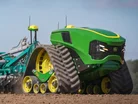Autonomous Vehicles Transform Agriculture

Autonomous vehicles are transforming agriculture by enhancing efficiency, sustainability and economic growth. These innovations promise a more productive future for farming.
The advent of AVs represents a transformative force in various industries, with agriculture poised for significant change. Autonomous agricultural machinery, including self-driving tractors, drones, and robotic harvesters, is set to change farming practices by enhancing efficiency, productivity, and sustainability.
Increased efficiency and productivity
One of the most profound impacts of AVs in agriculture is the dramatic increase in efficiency and productivity.
Traditional farming methods often involve manual labour and the use of human-operated machinery, which can be time-consuming and labour-intensive. Autonomous tractors and harvesters, equipped with advanced GPS systems, sensors and machine learning algorithms, can perform tasks such as ploughing, planting, and harvesting with precision and consistency, reducing human error and labour costs.
John Deere, a leading agricultural machinery manufacturer, has developed self-driving tractors that can operate 24/7 without human intervention. These tractors plant crops at optimal depths and spacing, ensuring uniformity and maximising yield. Moreover, autonomous harvesters can identify and pick ripe crops efficiently, minimising waste and ensuring high-quality produce.
John Deere's Chief Technology Officer, Jahmy Hindman, notes, "Integrating AI and machine learning in autonomous tractors and harvesters is not just about replacing labour but enhancing the decision-making process on farms, leading to smarter and more efficient farming practices." It underscores the strategic shift towards using technology to optimise agricultural processes beyond mere automation.
Enhanced sustainability
Sustainability is a critical concern in modern agriculture, and AVs are pivotal in promoting eco-friendly practices. Precision agriculture, facilitated by AVs, allows for the targeted application of fertilisers, pesticides and water, reducing the overall use of these resources and minimising environmental impact.
Drones, another autonomous technology, are increasingly used for crop monitoring and management. With multispectral imaging cameras, drones can survey large fields, providing farmers detailed data on crop health, soil conditions, and pest infestations.
The information enables farmers to make informed decisions, applying treatments only where needed, thereby reducing chemical runoff and conserving water.
Addressing labour shortages
Labour shortages are a persistent challenge in the agricultural sector, exacerbated by the physically demanding nature of farm work and the declining interest in agrarian careers among younger generations. AVs can alleviate the issue by taking over repetitive and strenuous tasks, allowing farmers to focus on more strategic and supervisory roles.
Economic implications
While the initial investment in autonomous agricultural machinery can be substantial, the long-term economic benefits are significant. Reduced labour costs, increased crop yields, and lower input costs due to precision agriculture improve farmers' profitability. Additionally, the data collected by AVs can be used to optimise future planting strategies, further enhancing productivity and profitability.
The widespread adoption of AVs in agriculture has broader economic implications. It can lead to new industries and job opportunities in agricultural technology, data analysis and equipment maintenance. As farms become more efficient and productive, they can contribute more significantly to the economy, supporting rural development and food security.
Challenges and considerations
Despite the numerous benefits, the integration of AVs in agriculture is challenging. High initial costs, technological complexity, and the need for reliable internet connectivity in rural areas can be barriers to adoption.
Additionally, there are concerns about the displacement of traditional farm workers and the ethical implications of increasing automation in agriculture.
To address these challenges, governments and industry stakeholders must collaborate to provide support for farmers, including financial incentives, training programs and infrastructure development. Ensuring that the transition to autonomous farming is inclusive and sustainable will be crucial for maximising the benefits while mitigating potential downsides.
The impact of autonomous vehicles on the agricultural sector will forever change the farming landscape, offering the potential for increased efficiency, enhanced sustainability, and economic growth. While challenges remain, AV technology's continued advancement and adoption promise to reshape farming practices, making agriculture more productive and resilient in the face of global challenges.
*******************
Make sure you check out the latest edition of EV Magazine and also sign up to our global conference series - Sustainability LIVE 2024.
*******************
EV Magazine is a BizClik brand.


